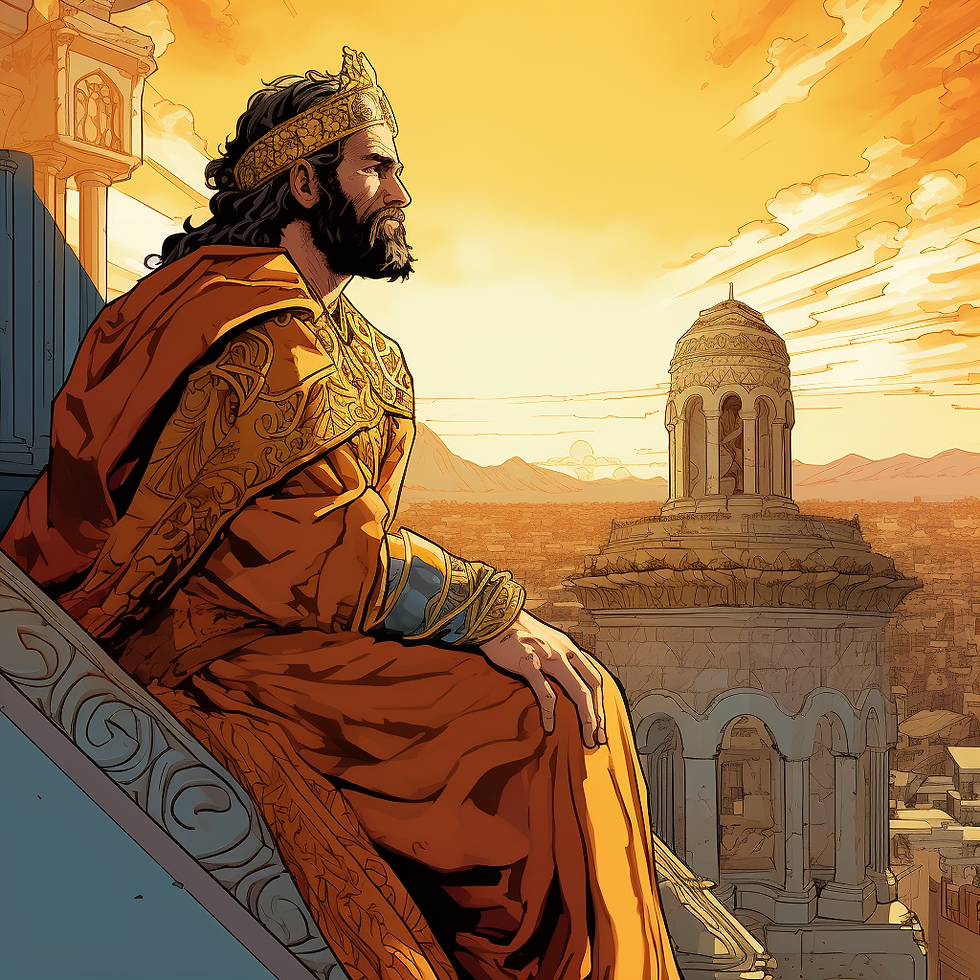Solomon's Legacy: A Tapestry of Wisdom and Literary Brilliance

In the annals of history, the era of Solomon (circa 971-931 BC) shines brightly, not only for the grandeur of his reign but for the profound wisdom encapsulated in the timeless verses of Proverbs and Ecclesiastes. This period marks a pinnacle of intellectual flourishing, with Solomon's literary contributions echoing through the corridors of time and finding parallels with the works of influential philosophers across diverse civilizations.
Solomon's Sage Counsel in Proverbs:
At the heart of Solomon's literary legacy stands the Book of Proverbs, a treasury of sage advice and moral precepts. Comprising short, impactful verses, Proverbs imparts timeless wisdom on matters of ethics, governance, and virtuous living. The parallel between Solomon's proverbs and the philosophical maxims of renowned thinkers is striking, emphasizing universal truths that resonate across cultures and eras.
Key Themes in Proverbs:
Wisdom's Call: Proverbs 1:20-33 presents Wisdom as a personified entity, calling out to humanity to embrace knowledge and understanding.
The Fear of the Lord: A recurring theme, the reverence for God is portrayed as the beginning of wisdom, influencing ethical decision-making.
Ecclesiastes: Solomon's Reflective Journey:
Ecclesiastes, often regarded as one of the most philosophical books in the Bible, presents a reflective and introspective Solomon. The narrative explores the complexities of life, the pursuit of meaning, and the inevitability of mortality. This introspective tone aligns with the existential inquiries found in the works of influential philosophers.
Key Themes in Ecclesiastes:
Vanity of Earthly Pursuits: Ecclesiastes 1:2 famously declares, "Vanity of vanities, says the Preacher, vanity of vanities! All is vanity." This overarching theme contemplates the fleeting nature of worldly pursuits.
Time and Seasons: Ecclesiastes 3:1-8 muses on the cyclical nature of time, highlighting the ebb and flow of life's seasons.
A Continuum of Wisdom:
Solomon's wisdom, encapsulated in Proverbs and Ecclesiastes, transcends temporal and cultural boundaries. As students delve into these profound texts, they embark on a journey through a continuum of human wisdom, connecting with the intellectual flourishing of diverse civilizations. Solomon's legacy endures as a testament to the enduring pursuit of knowledge and understanding that unites humanity across the ages.
History of the World during the Era of Solomon

In the luminous tapestry of history, the era of Solomon (circa 971-931 BC) emerges as a beacon of intellectual brilliance and literary contributions. At the heart of this epoch lies Solomon's wisdom, encapsulated in the timeless verses of Proverbs and Ecclesiastes. Examining this period not only unveils the intellectual richness of Solomon's reign but also draws parallels with other eras marked by profound philosophical and literary achievements.
1. The Axumite Empire (c. 940-1000 AD): During the zenith of Solomon's reign, the Axumite Empire in Africa thrived, marking an era of prosperity and cultural exchange. Parallels can be drawn between Solomon's focus on cultural contributions and the flourishing of the Axumite civilization, known for its distinctive architecture and contributions to the arts.
2. The Vedas in Ancient India (c. 1500-500 BC): Concurrently, the Vedic period in ancient India witnessed the composition of the Vedas, foundational texts of Hindu philosophy and knowledge. This intellectual flourishing echoes Solomon's wisdom literature, emphasizing the pursuit of knowledge and ethical living, albeit in different cultural contexts.
3. The Golden Age of Greece (c. 5th-4th centuries BC): Solomon's era aligns with the Golden Age of Greece, characterized by the philosophical brilliance of figures like Socrates, Plato, and Aristotle. The dialogues and musings of these Greek philosophers mirror the intellectual pursuits of Solomon, illustrating the universality of wisdom-seeking across diverse civilizations.
4. Confucianism in Ancient China (c. 551-479 BC): In ancient China, the teachings of Confucius unfolded during the same general period. The emphasis on ethical conduct, moral rectitude, and the cultivation of wisdom in Confucian philosophy resonates with Solomon's proverbs, emphasizing virtues and ethical living.
5. The Library of Alexandria (c. 3rd century BC – 3rd century AD): The timeframe coincides with the flourishing of the Library of Alexandria, a hub of intellectual activity in the Hellenistic world. Solomon's literary contributions find a parallel in the collective knowledge amassed at the Library, symbolizing an era where wisdom was revered and disseminated.
6. The Upanishads in Ancient India (c. 800-200 BC): A concurrent intellectual development in ancient India, the Upanishads, delved into profound philosophical inquiries. The exploration of metaphysical questions and the pursuit of spiritual understanding in the Upanishads align with Solomon's contemplative reflections in Ecclesiastes.
7. The Silk Road (c. 2nd century BC – 14th century AD): The historical context of Solomon's wisdom coincides with the flourishing of the Silk Road, fostering cultural and intellectual exchanges across Asia, the Middle East, and Europe. The cross-cultural dialogues facilitated by the Silk Road mirror the openness to diverse perspectives seen in Solomon's wisdom literature.
Solomon's reign stands as a testament to the enduring pursuit of wisdom and intellectual contributions across varied cultures and civilizations. As students delve into the wisdom of Proverbs and Ecclesiastes, they embark on a journey through a panorama of intellectual flourishing, drawing connections between Solomon's era and other epochs where the quest for knowledge illuminated the human experience.
Lessons from Solomon's Proverbs and Ecclesiastes

The timeless wisdom embedded in the biblical books of Proverbs and Ecclesiastes, attributed to the illustrious King Solomon (circa 971-931 BC), continues to resonate across centuries, offering profound life lessons and insights into the human experience. As students delve into these ancient texts, they embark on a journey of self-discovery and intellectual exploration, uncovering lessons that echo through the corridors of history and parallel the works of influential philosophers.
1. The Pursuit of Wisdom:
Proverbs 1:7 - "The fear of the Lord is the beginning of knowledge, but fools despise wisdom and instruction."
In the pursuit of wisdom, Solomon lays a foundational principle: reverence for a higher power and an openness to knowledge. This echoes the teachings of philosophers like Socrates, who emphasized the importance of self-awareness and continuous learning. Students learn that embracing wisdom requires humility and an acknowledgment of the vastness of the intellectual journey.
2. Ethical Conduct and Virtue:
Proverbs 12:22 - "The Lord detests lying lips, but he delights in people who are trustworthy."
Solomon's Proverbs abound with ethical guidelines and principles of virtuous living. The emphasis on honesty, integrity, and trustworthiness aligns with the ethical teachings of influential philosophers, including Confucius and his emphasis on moral conduct. Students learn that ethical virtues are not bound by time or culture but form the bedrock of a principled life.
3. Reflection on Life's Meaning:
Ecclesiastes 3:1 - "There is a time for everything, and a season for every activity under the heavens."
Ecclesiastes, often seen as Solomon's introspective journey, prompts students to reflect on life's transient nature and the inevitability of change. Parallel to existentialist philosophers like Jean-Paul Sartre, Ecclesiastes encourages students to grapple with questions of meaning and purpose in the face of life's uncertainties.
4. Embracing Intellectual Inquiry:
Ecclesiastes 12:12 - "Be warned, my son, of anything in addition to them. Of making many books there is no end, and much study wearies the body."
Solomon's acknowledgment of the exhaustive nature of intellectual pursuits resonates with the philosophical views of thinkers like Aristotle, who valued a balanced approach to learning. Students learn the importance of intellectual inquiry but also the need for balance and a holistic perspective on life.
5. The Universality of Human Experience:
Ecclesiastes 1:9 - "What has been will be again, what has been done will be done again; there is nothing new under the sun."
Solomon's reflections on the cyclical nature of human experience connect with the historical perspective of philosophers like Heraclitus, who emphasized the eternal recurrence of patterns in life. Students grasp the universality of human struggles and triumphs, realizing that the challenges faced by ancient societies echo in contemporary times.
Wisdom Beyond Ages
Studying the wisdom of Solomon in Proverbs and Ecclesiastes offers students a unique opportunity to draw parallels with the intellectual flourishing of diverse civilizations. The lessons gleaned from these ancient texts transcend the confines of time and culture, providing a timeless guide for navigating the complexities of human existence. As students engage with the wisdom of Solomon, they embark on a journey of self-discovery, intellectual curiosity, and a deeper understanding of the enduring threads that weave through the tapestry of human history.

Comentarios